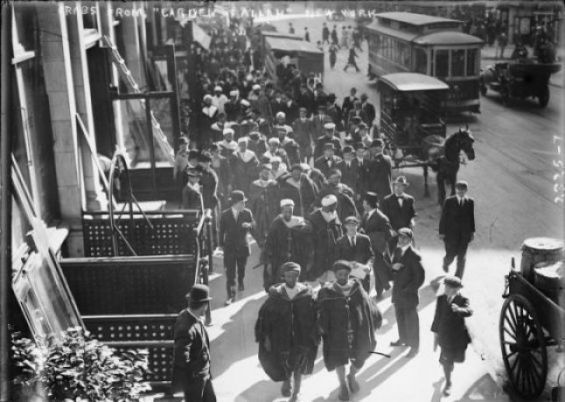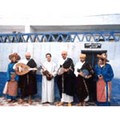In the beginning of the 20th century, Moroccan performers were making heads turn in Broadway, New York. Tens of them used to travel to the United States to sing, dance, perform acrobatic feats and act in plays.
These men, often identified at the time as Riffian, Berber or moors, sailed to New York under the guardianship of one man. Sie Hassan Ben Ali, a Moroccan and a naturalized American citizen, who was the one behind the performances that brought these tribesmen all the way to the Big Apple.
Through his company Hassan Ben Ali Arabs Co., the entertainer who used to perform throughout the United States in the 1880s used to hire Moroccans and cast them in several shows. The idea came to his mind when he returned to Morocco in 1891 «to gather 'dwarfs' to show at the Chicago fair», wrote Lebanese Studies.

This Moroccan entertainer, who once tried to «bring back a complete Moroccan village to reconstruct in Chicago», introduced other crazy ideas. According to the same source, during one of his performances «he presented a reenactment of the violent capture of Africans by Arab slavers».
Moroccan performers in Broadway
After years of performing alongside Moroccan men in Chicago, Ben Ali decided to move to Coney Island around 1900 and play in stages there.
«Since the 1890s, Ben Ali periodically brought Moroccans to perform as acrobats, dancers, musicians, and stage actors at Luna Park, Dreamland and and theaters in New York City—as well as for Buffalo Bill's Wild West show, state fairs, sideshows and International Expositions throughout the U.S.», recalls an article on North African Immigrants in the United States.
Ben Ali was mostly known for his 'Garden of Allah', a 1911 Broadway production. The Moroccan was hired to bring performers for the play that was «a hit and would go on to tour nationally for several years and subsequently be adapted into a motion picture three times between 1916 and 1936», the same source revealed.

In 1912, Ben Ali brought a group of 20 Moroccan performers to play in the second season of the Garden of Allah. These performers were brought to perform and leave, but during their sojourns, they created a source of attraction for New Yorkers.
The same article recalls that «Ben Ali appears to have intentionally made them quite visible throughout their time in the U.S. Besides theatrical engagements, they would take part in promotional work for various businesses, including well-publicized appearances at oriental rug stores, even when on tour across the country».
Indeed, a black and white photo shows «over 20 Riff Berbers walking a crowded sidewalk in New York, perhaps shortly after their arrival at Ellis Island in August 1912».
Dressed in their traditional attire, the Moroccan performers were «maneuvering uneasily on a busy New York sidewalk», while «New Yorkers of all ages smile, gawk, or blithely stare on at the slow moving spectacle».
In 1913, another group of Moroccans was brought by Ben Ali to New York to participate to the production of 'Fire and Sword: The Fall of Adrianople', during which they performed as Turks.
Professional sojourners
But after the end of their performances and professional sojourns in the US, these men had to return to Morocco. Ben Ali was responsible of bringing them back the same way he brought them in.

In an October 1913 article, the New York Tribune, the responsibility of Ben Ali was thoroughly explained. «Hassan Ben Ali will breathe a sigh of relief when the last of the Serbs [i.e. Berbers], the Arab tribesman who have been appearing in 'Fire and Sword' at Luna, have been safely shipped aboard a vessel bound for the Mediterranean», the newspaper wrote,
«For Hassan is under bond to the immigration authorities for every man of them, and must kiss goodbye to a sheaf of 100 bills for everyone who is not accounted for at the end of the month», it exlained.
Indeed, after performing in the US, the Moroccan acrobats and entertainers left for the Kingdom. Few others, according to history resources, managed to stay opening the door for a one-of-a-kind immigration wave of Moroccans to America.




 chargement...
chargement...












